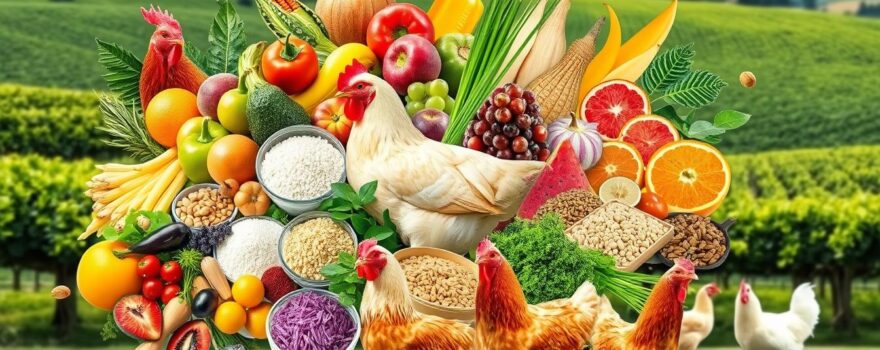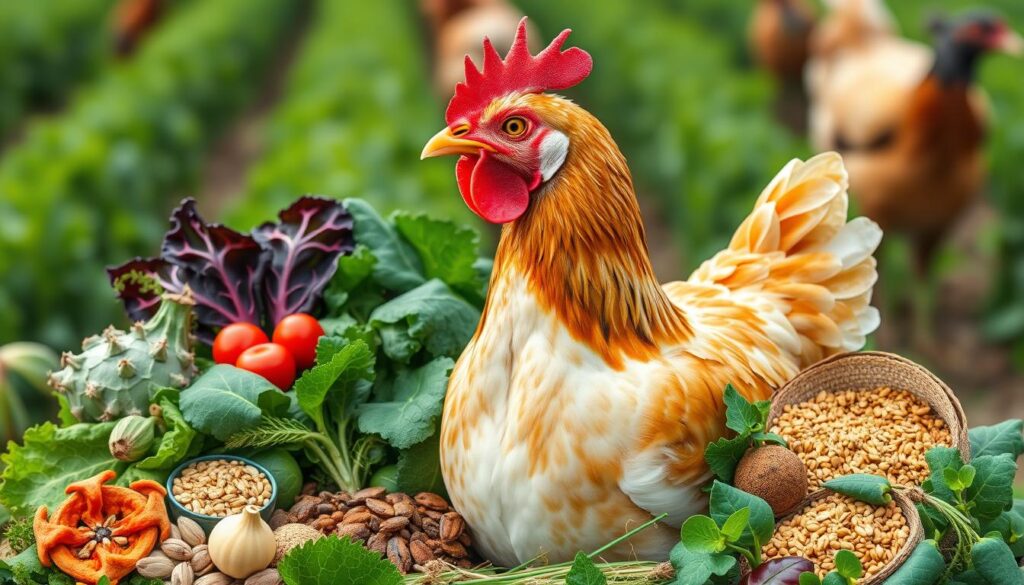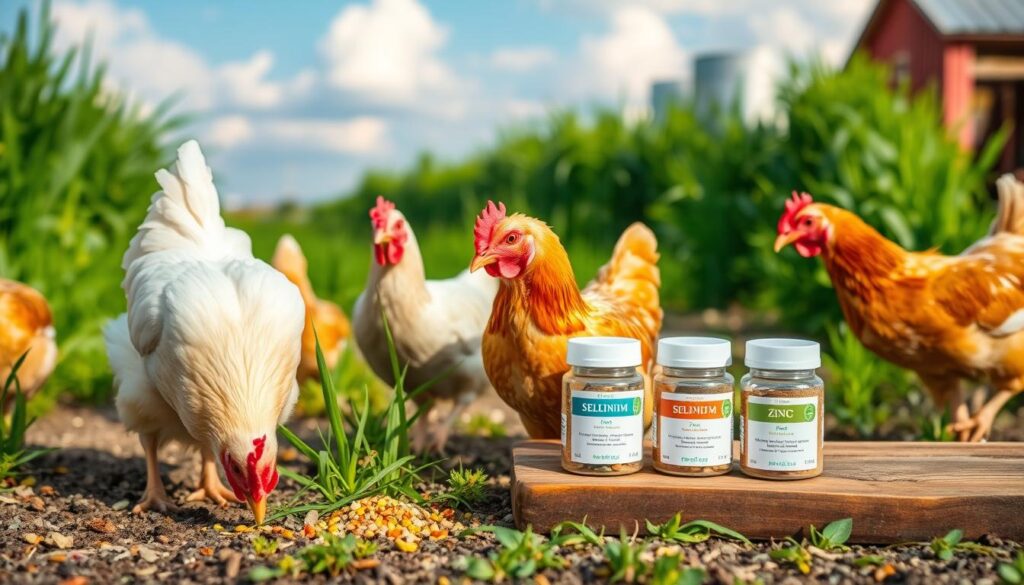
Poultry, especially broiler chickens, need lots of nutrients because they grow fast. They require at least 38 essential nutrients in the right amounts. Micronutrients, like vitamins and minerals, are key for their health and growth. It’s important to feed them well to help them stay healthy and productive.
Key Takeaways:
- Broiler chickens have high nutrient requirements due to their rapid growth and productivity.
- Micronutrients, such as vitamins and minerals, are essential for supporting various physiological processes in broilers.
- Proper supplementation and balanced feeding are crucial to unlocking the genetic potential of broiler chickens.
- Micronutrient deficiencies can lead to impaired growth, health, and production in broiler flocks.
- Optimizing micronutrient intake is a key strategy for enhancing broiler performance and overall flock well-being.
Introduction
Broiler chickens need specific nutrients to grow well and stay healthy. The National Research Council (NRC) set standards in 1994. These standards help make the best diets for broilers.
But, these standards assume nutrients are easily used by the body. They don’t account for how well different foods work. So, we must adjust the diets based on how well nutrients are absorbed and any health issues.
Importance of Micronutrients in Broiler Diets
Micronutrients like vitamins and minerals are key for broilers. They help with growth, health, and fighting off sickness. Adding the right amounts of vitamins A, E, and B-complex, and minerals like selenium, zinc, and copper is crucial.
This helps broilers grow to their best and use feed more efficiently. It also makes them stronger against diseases and harsh environments.
Making broiler diets right means balancing macronutrients (like protein and fats) and micronutrients. This balance is key for their health and performance. It lets them reach their full potential.
“Proper supplementation of micronutrients can help broilers reach their full genetic potential, improve feed efficiency, and enhance resistance to diseases and environmental stressors.”
Antioxidant Dipeptides: Carnosine and Anserine
Carnosine and anserine are strong antioxidant dipeptides found in animal muscles, including poultry. They are key to muscle function, flavor, and meat quality.
Functions and Benefits of Carnosine and Anserine
Carnosine keeps muscle acidity right. It also fights glycation and aging, and aids neurotransmitters. Anserine, a carnosine variant, does similar good for poultry health and performance.
These dipeptides boost meat’s lipid stability and taste. They make meat more nutritious and tasty, adding value to poultry production.
Levels in Native Chicken Strains vs. Broilers
A study looked at carnosine, anserine, and other nutrients in chicken breast meat. It found native chicken strains have more of these beneficial compounds than broilers.
The HH native chicken had the most carnosine and anserine. The 2C strain had the most reducing sugars. This shows some native chickens are better for meat quality and nutrition.
| Compound | Native Chicken Strain HH | Native Chicken Strain 2C | Broilers |
|---|---|---|---|
| Carnosine | Highest | Medium | Lowest |
| Anserine | Highest | Medium | Lowest |
| Reducing Sugars | Medium | Highest | Lowest |
This study shows native chicken strains have nutritional and quality benefits over broilers. They have better antioxidants and functional compounds.
Reducing Sugars and Meat Flavor
Reducing sugars like ribose, glucose, and glucose-6-phosphate are key in making meat taste good. They react with amino compounds during cooking. This creates the unique flavors we love in chicken.
Role of Reducing Sugars in Meat Flavor Development
Adding a bit of ribose to chicken makes it taste better. It helps create the meaty, roasted flavors we enjoy. This happens because of the Maillard reaction, where sugars and amino acids mix to form meat aroma compounds.
Research shows that how sugars react matters. Ketose sugars like fructose react more than aldose sugars like glucose. This affects the meat flavor we get.
| Reducing Sugar | Reactivity in Maillard Reaction | Impact on Meat Flavor |
|---|---|---|
| Ribose | High | Enhances meaty, roasted flavor |
| Glucose | Moderate | Contributes to overall flavor profile |
| Fructose | High | Produces distinctive flavor compounds |
The Maillard reaction is complex and depends on several factors. Temperature, pH, time, and water activity all play a role. By adjusting these, we can make meat taste even better.
Essential Amino Acids and Protein Quality
Chicken meat is packed with high-quality protein. It has all the essential amino acids we need for health and growth. These amino acids are key for fixing tissues and boosting our immune system.
Chicken also offers other vital nutrients like fatty acids, vitamins, and minerals. It’s a great source of B-complex vitamins and vitamin B12. Plus, it has iron, zinc, and phosphorus, and many bioactive compounds.
The nutritional value of chicken makes it a favorite food. Adding synthetic amino acids to chicken feed can make it even better. It helps with growth, reduces waste, and keeps birds healthy.
Chicken meat can also help with heat stress in birds. It has amino acids that reduce heat shock proteins. This improves gut health and overall well-being.
Chicken meat supports the growth of beneficial gut bacteria. It boosts development, feed efficiency, and immunity in birds. This is thanks to amino acids that help produce butyric acid and short-chain fatty acids.
| Nutrient | Benefits of Chicken Meat |
|---|---|
| Protein | Contains all essential amino acids for human health and growth |
| Fatty Acids | Rich in beneficial fatty acids |
| Vitamins | High in B-complex vitamins and vitamin B12 |
| Minerals | Good source of iron, zinc, and phosphorus |
| Bioactive Compounds | Contains various beneficial bioactive compounds |
Chicken is becoming more popular in the US. Its high-quality protein and nutrients make it a great choice for many.
Vitamins and Minerals in Broiler Nutrition
Vitamins and minerals are key in broiler chicken nutrition. They help with growth, development, and health. It’s important to balance them well for the best results.
Importance of Vitamins in Broiler Diets
Vitamins are crucial for broiler chickens. They boost the immune system and help with growth. Vitamins A, E, and K are especially important for health and growth.
Role of Minerals in Broiler Health and Performance
Minerals like selenium and zinc are also essential. They support the immune system and bone health. A balanced diet with these minerals is key for health and quality.
| Micronutrient | Key Functions in Broilers | Consequences of Deficiency |
|---|---|---|
| Vitamins |
|
|
| Minerals |
|
|
By providing the right vitamins and minerals, producers can improve health and quality. This benefits the industry and consumers alike.
Micronutrients and Their Importance in Broiler Chicken Nutrition
Micronutrients, like vitamins and minerals, are vital for broiler chicken health. They help with growth, immune function, and making high-quality meat and eggs. It’s important to give broilers the right amount of these nutrients to improve their performance and the quality of their products.
The poultry industry in Nigeria is big, making up 9-10% of the agricultural GDP. There are about 140 million chickens, with 25% used for commercial purposes. But, infectious bursal disease (IBD) is a big problem, causing high death rates in chickens, even with vaccines.
Micronutrients like selenium and zinc are key for broiler chicken health. Organic selenium and zinc help chickens grow and fight off diseases better. But, the levels of these nutrients in the chickens’ bodies can drop over time.
| Group | 5th Week Weight (kg) | 6th Week Weight (kg) |
|---|---|---|
| NSV (No Selenium and Zinc) | 1.64 ± 0.13 | – |
| VSZ (Selenium and Zinc Supplemented) | 2.00 ± 0.12 | – |
| SZV (Selenium and Zinc Supplemented) | – | 2.04 ± 0.18 |
Selenium helps chickens fight off diseases better. Zinc also boosts immunity by supporting various immune cells. These nutrients are needed in small amounts for important body functions.
Experts now say the minimum amounts of micronutrients are not enough. The latest research suggests higher amounts are needed for optimal health. Modern chicken breeds need even more nutrients to perform well.

In summary, micronutrients are very important for broiler chicken health. They support many body functions and improve the quality of chicken products. Giving broilers the right nutrients is essential for their growth and health.
Bioavailability of Micronutrients
Getting the most out of vitamins and minerals is key for broiler chickens’ health and performance. But, how well they use these nutrients can change based on several things. These include nutrient interactions, antinutritional factors, feed processing methods, gut health, and environmental stressors.
Factors Affecting Nutrient Bioavailability
Understanding how nutrients work together is vital in broiler nutrition. For example, water-soluble vitamins can be lost in urine if eaten too much. On the other hand, fat-soluble vitamins like A, D, E, and K are stored in the liver and fatty tissues. This shows why it’s important to get the right mix and supplements for best results.
Also, antinutritional factors in some feed can block nutrient absorption. How feed is processed, like through extrusion or pelleting, can also change micronutrient bioavailability. This is because it can change the feed’s physical and chemical makeup.
Lastly, gut health is crucial for nutrient absorption. Environmental stressors can upset the gut microbiome. This can make it harder for broiler chickens to absorb and use nutrients.
| Micronutrient | Factors Affecting Bioavailability |
|---|---|
| Vitamins | Water-soluble vitamins can be flushed out in urine, while fat-soluble vitamins are mainly stored in the liver and fatty tissues. |
| Minerals | Poultry species, age, sex, maturity, climate, and feed content can all affect mineral absorption. Macrominerals like calcium, phosphorus, and magnesium are needed in larger amounts for bone formation, while microminerals like manganese, zinc, iron, copper, cobalt, iodine, selenium, and chromium are required in small concentrations for vital functions. |
Knowing how these factors affect nutrient bioavailability helps broiler producers. They can then make their feed more nutritious. This ensures broiler chickens get the most from their diet.
Selenium and Zinc Supplementation
Keeping broiler chickens healthy and growing well is key. A study looked at adding organic selenium and zinc to their food. This was for both chickens that had been vaccinated and those that hadn’t against Infectious Bursal Disease (IBD).
The study found that adding these nutrients made selenium and zinc more available. It also boosted the chickens’ antioxidant levels and helped them grow more. The chickens that got both selenium and zinc grew the most.
| Micronutrient Supplementation | Antioxidant Status | Weight Gain |
|---|---|---|
| Selenium | Increased glutathione peroxidase and catalase levels | Higher weight gain compared to unsupplemented group |
| Zinc | Increased glutathione peroxidase and catalase levels | Higher weight gain compared to unsupplemented group |
| Selenium and Zinc | Highest increase in glutathione peroxidase and catalase levels | Highest weight gain compared to all groups |
This study shows how crucial selenium and zinc are in broiler chicken diets. They support health, immunity, and growth, even when facing diseases like Infectious Bursal Disease.

Impact of Micronutrient Deficiencies
Consequences of Vitamin and Mineral Deficiencies
Micronutrient deficiencies can harm broiler chickens’ health and performance. Lack of vitamins and minerals like vitamin A, vitamin E, and B-complex vitamins can cause problems. These include slow growth, weak immune systems, bad feathers, and weak bones.
Vitamin A is key for broiler chickens’ health. Without enough, they grow slower, have poor reproductive health, and weaker immune systems. Minerals like selenium and zinc also play a big role. Without them, chickens gain less weight and fight off diseases poorly.
It’s important to make sure broiler diets have enough of these nutrients. This keeps the birds healthy and helps them reach their full potential. Ignoring these needs can harm the chickens’ health and the quality of the meat.
| Micronutrient | Deficiency Consequences |
|---|---|
| Vitamin A | Growth retardation, skeletal abnormalities, compromised organ development |
| Vitamin E | Weakened immune function, increased susceptibility to disease |
| Selenium | Impaired antioxidant status, reduced weight gain |
| Zinc | Decreased immune response, poor feather quality |
By fixing micronutrient deficiencies, farmers can make their broilers healthier and more productive. This improves the quality of their poultry products and makes their farms more efficient and profitable.
Dietary Strategies for Optimizing Micronutrient Intake
To ensure broilers get the right nutrients, a detailed plan is needed. It’s important to formulate feeds that have enough vitamins and minerals. Using organic minerals can help the birds use these nutrients better.
Keeping nutrients intact during feed making is also key. Techniques like conditioning, pelleting, and extrusion help keep micronutrients strong. This way, the nutrients stay effective for the birds.
Keeping the gut healthy is another big step. A healthy gut helps the birds use nutrients better. Adding probiotics, prebiotics, or phytogenic compounds can help the gut and nutrient absorption.
It’s also important to avoid nutrients that can block the absorption of others. Some ingredients might not be good for nutrient use. By fixing this, broilers can get the nutrients they need to grow well and produce quality meat.
| Dietary Strategy | Purpose |
|---|---|
| Proper Feed Formulation | Meet or exceed recommended micronutrient levels |
| Use of Bioavailable Nutrient Sources | Enhance micronutrient utilization by broilers |
| Preservation of Nutrient Integrity | Maintain potency of micronutrients during feed processing |
| Gut Health Support | Improve birds’ ability to utilize available micronutrients |
| Mitigation of Antinutritional Factors | Optimize micronutrient bioavailability |
By using these strategies, broiler producers can make sure their birds get the nutrients they need. This helps the birds grow well and produce high-quality meat.
“Optimizing micronutrient intake in broiler diets is a multifaceted challenge that requires a strategic approach to feed formulation, processing, and gut health management.”
Micronutrients, like vitamins and minerals, are key for broiler chicken health. They help with growth, immune function, and making high-quality poultry. It’s important to give these birds the right nutrients to reach their full potential.
Good nutrition leads to better feed efficiency and higher quality poultry. This is vital as the demand for safe, nutritious poultry grows. The price of soybeans has gone up 90% worldwide in the last 5 years (USDA, 2022). So, making sure broiler chickens get the right nutrients is more important than ever.
Using the latest research on micronutrients can improve many aspects of broiler chicken health. This includes a stronger immune system, better egg production, and stronger bones. This means consumers get a more nutritious and higher-quality product.